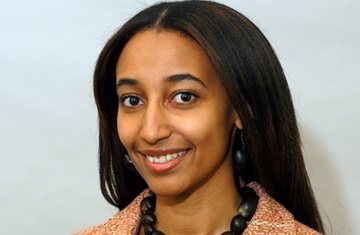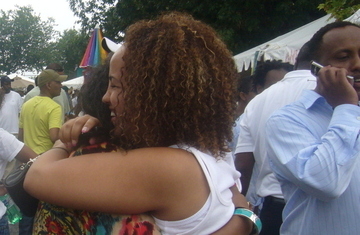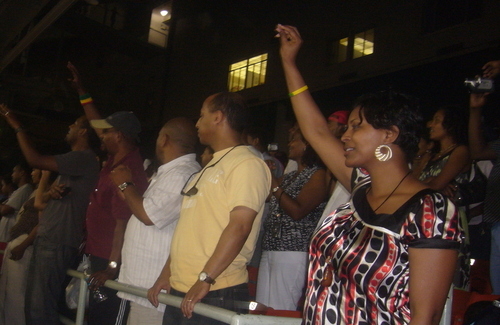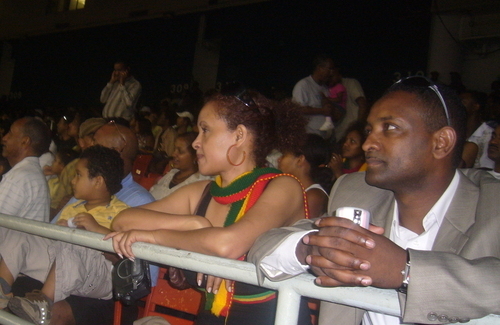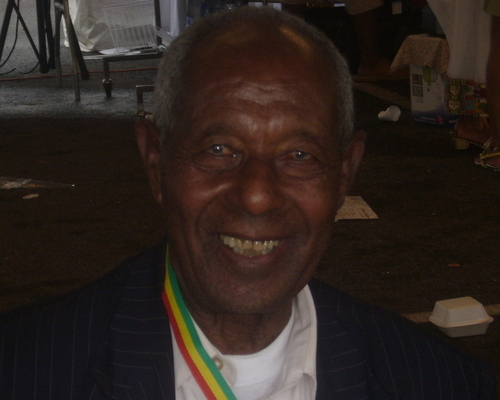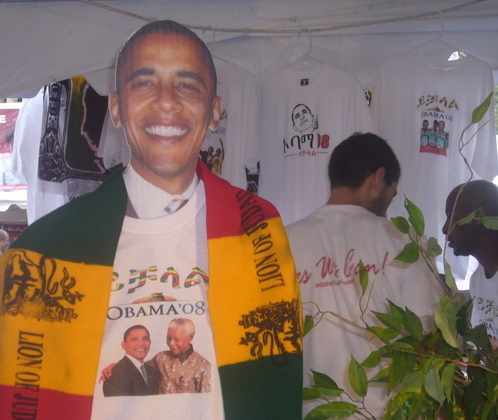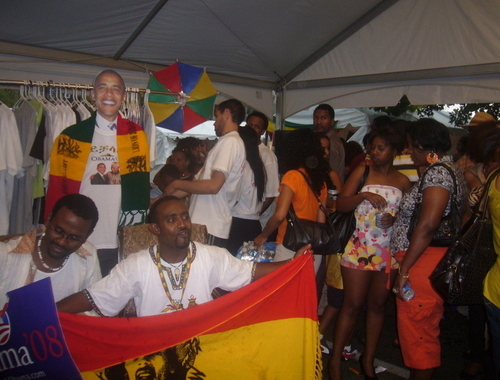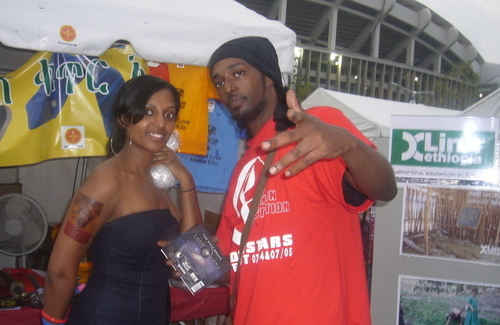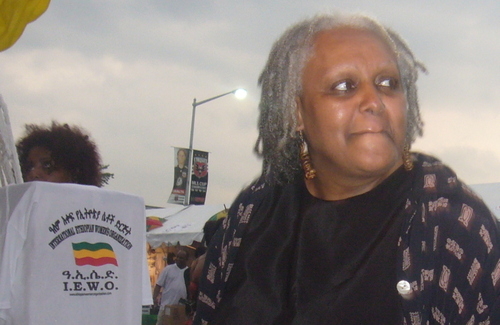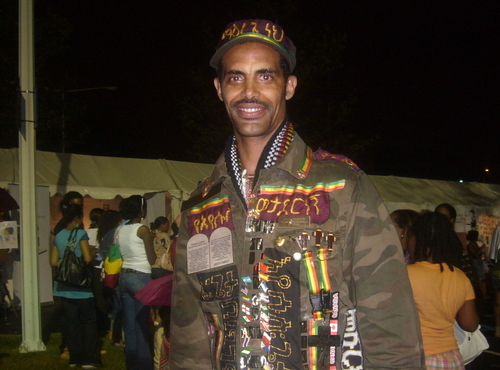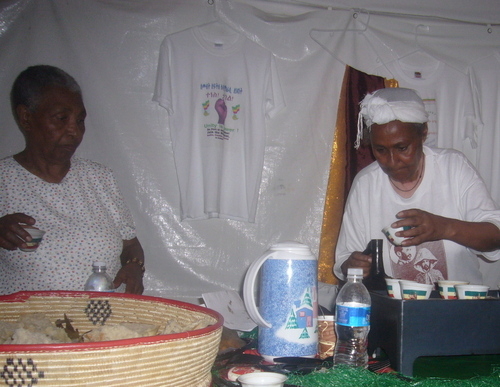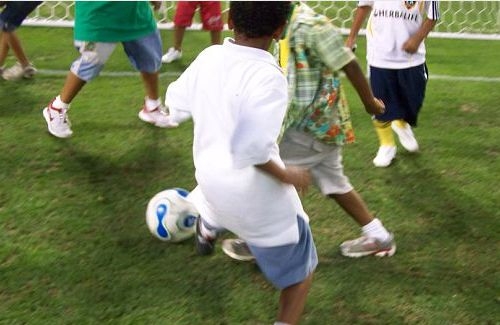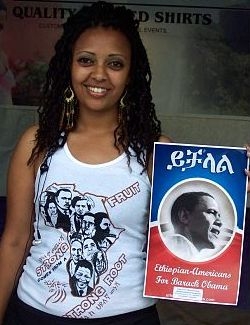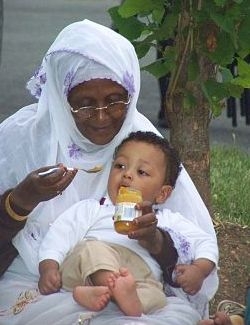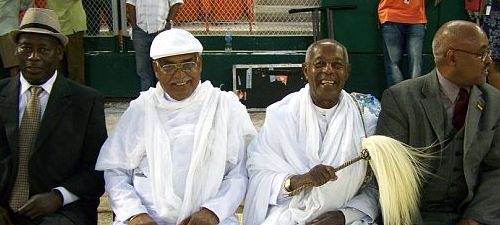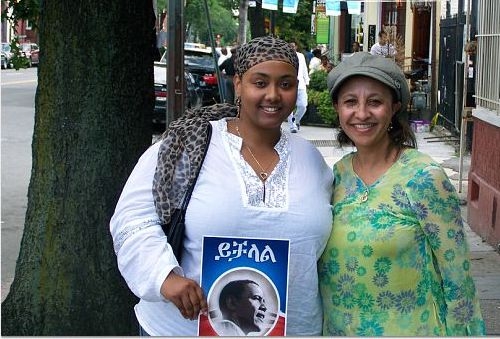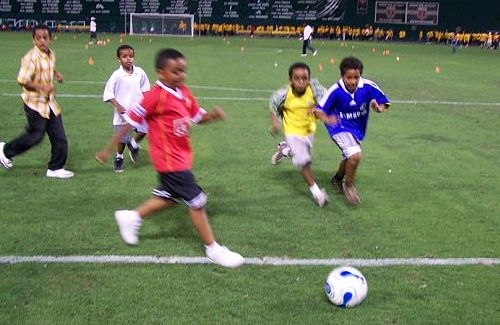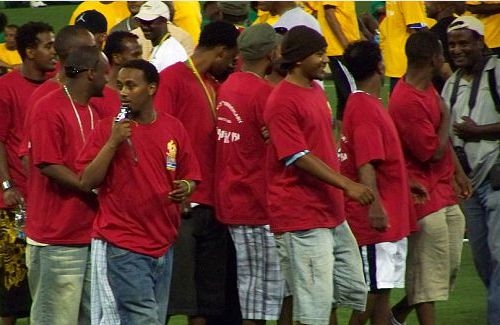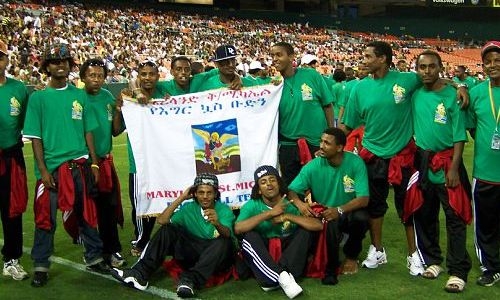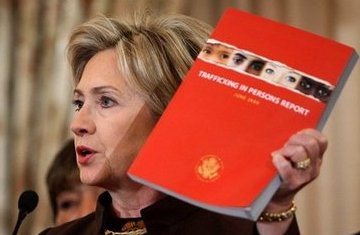
Above: Hillary Clinton holds up the the ninth annual U.S.
Department of State Trafficking in Persons Report in
Washington, DC, 16 Jun 2009
VOA
Clinton says Combating Human Trafficking ‘Critical’
By David Gollust
State Department
16 June 2009
Secretary of State Hillary Clinton says the fight against human trafficking, abroad and in the United States, is a critical part of the Obama administration’s agenda. She spoke on the release of a State Department report that listed 17 countries as failing to make significant efforts to address the problem. Read more at VOA.
Ethiopia is one of the countries cited by the report:
Ethiopia is a source country for men, women, and children trafficked primarily for the purposes of forced labor and, to a lesser extent, for commercial sexual exploitation. Rural Ethiopian children are trafficked for domestic servitude and, less frequently, for commercial sexual exploitation and forced labor in agriculture, traditional weaving, gold mining, street vending, and begging. Young women from all parts of Ethiopia are trafficked for domestic servitude, primarily to Lebanon, Saudi Arabia, and the UAE, but also to Bahrain, Djibouti, Sudan, Syria, and Yemen. Djibouti, Egypt, and Somaliland are reportedly the main transit routes for trafficked Ethiopians. Some women are trafficked into the sex trade after arriving at their destinations. Small numbers of men are trafficked to Saudi Arabia and the Gulf States for low-skilled forced labor. While the number of registered labor migration employment agencies rose from 36 to 90 between 2005 and 2008, the government significantly tightened its implementation of regulations governing these agencies over the same period. This resulted in an increase in trafficked Ethiopians transiting neighboring countries rather than traveling directly to Middle Eastern destinations.
The Government of Ethiopia does not fully comply with the minimum standards for the elimination of trafficking; however, it is making significant efforts to do so. While the Ethiopian government’s ongoing efforts to provide pre-departure orientation to Ethiopian migrant workers and partner with a local NGO to detect cases of child trafficking within the country are notable, its limited capacity to prosecute trafficking crimes is a continued cause for concern. Police investigators remain unable to properly distinguish trafficking cases from those of other crimes or to conduct thorough investigations, and the judicial system routinely is unable to track the status of trafficking cases moving through the courts.
Recommendations for Ethiopia: Improve the investigative capacity of police and enhance judicial understanding of trafficking to allow for more prosecutions of trafficking offenders, particularly perpetrators of internal child trafficking; institute trafficking awareness training for diplomats posted overseas; engage Middle Eastern governments on improving protections for Ethiopian workers and developing a mechanism to refer trafficking victims for assistance; partner with local NGOs to increase the level of services available to trafficking victims returning from overseas; and launch a campaign to increase awareness of internal trafficking at the local and regional levels.
Prosecution
While the government sustained its efforts to prosecute and punish international trafficking offenders and initiated investigations of internal child trafficking during the reporting period, prosecution of internal trafficking cases remained nonexistent. In addition, law enforcement entities continued to exhibit an inability to distinguish human trafficking from smuggling, rape, abduction, and unfair labor practices. Articles 596 through 600 and 635 of Ethiopia’s Penal Code prohibit all forms of trafficking for labor and sexual exploitation.
The Federal High Court’s 11th Criminal Bench was established in late 2007 to hear cases of transnational trafficking, as well as any trafficking cases discovered in the jurisdiction of Addis Ababa. In June 2008, the court sentenced a man under Proclamation 104/1998 to 15 years’ imprisonment and fined him $1,357 for illegally sending an Ethiopian woman to Lebanon where she was forced to work as a domestic servant and later thrown from a building by her employer. A second defendant received five years’ imprisonment and a $452 fine for facilitating the same woman’s trafficking for domestic servitude. In 2008, police at Addis Ababa’s central bus terminal received 899 reports of internal child trafficking, an increase over the previous year. However, unlike prior reporting periods, the unit did not provide statistics on the number of cases referred to the prosecutor’s office in
2008 or the status of cases referred to the prosecutor’s office in the preceding year. Some local police and border control agents are believed to have accepted bribes to
overlook trafficking.
Protection
Although the government lacks the resources to provide direct assistance to trafficking victims or to fund NGOs that provide victim care, police employ victim identification and referral procedures in the capital, regularly referring identified internal trafficking victims to NGOs for care. During the year, the Child Protection Units (CPUs) – joint police-NGO identification and referral units operating in each Addis Ababa police station – rescued and referred children to the CPU in the central bus terminal, which is dedicated exclusively to identifying and obtaining care for trafficked children. In 2008, this unit identified 899 trafficked children, 75 percent of whom were girls. It referred 93 trafficked children to NGO shelters for care and family tracing and reunified 720 children with parents or relatives in Addis Ababa and in outlying regions. Local police and officials in the regional administrations assisted in the return of the children to their home areas. The Addis Ababa city government’s Social and Civil Affairs Department reunified an additional 46 children with their families in the capital and placed 40 children in foster care in 2008. During the year, police in Dessie Town, Amhara region replicated the CPU’s social programs without international assistance. In July 2008, the government assisted IOM with the repatriation of Ethiopian trafficking victims from Dar es Salaam to their home regions. Ethiopian missions in Jeddah, Riyadh, and Beirut have offices that provide general services to the local Ethiopian community, including limited referrals for labor-related assistance. The Ethiopian government showed no sign of engaging the governments of these destination countries in an effort to improve protections for Ethiopian workers and obtain protective services for those who are trafficked. The government made no effort to interview returned victims about their experiences in the Middle East.
Returned women rely heavily on the few NGOs that work with adult victims and psychological services provided by the government’s Emmanuel Mental Health Hospital. In 2008, there were no reports of trafficking victims being detained, jailed, or prosecuted for violations of laws, such as those governing immigration. While police encourage trafficking victims’ participation in investigations and prosecutions, resource constraints prevent police from
providing economic incentives to victims. In January 2009, the government passed the Charities and Societies Proclamation, which, among other things, prohibits foreign-funded NGOs from informing victims of their rights under Ethiopian law or advocating on behalf of
victims; this proclamation may have a negative impact on Ethiopia’s protection of trafficking victims.
Prevention
Ethiopia’s efforts to prevent international trafficking increased, while measures to heighten awareness of internal trafficking remained limited. In May 2008, after a series of deaths of Ethiopian maids in Lebanon, the government officially banned its citizens from traveling to the country; the ban remains in effect. During the reporting period, the Ministry of Labor and Social Affairs (MOLSA), employing two full-time counselors, provided 18,259 migrating workers with three-hour pre-departure orientation sessions on the risks of labor migration and the conditions in receiving countries. While these pre-departure preventative measures are commendable, they need to be matched by meaningful victim protection measures provided by the Ethiopian government in the countries to which the workers were destined. In addition, Private Employment Agency Proclamation 104/1998 governs the work of international employment agencies and protects Ethiopian migrant workers from fraudulent recruitment or excessive debt situations that could contribute to forced labor. These statutes prescribe punishments of five to 20 years’ imprisonment, which are sufficiently stringent and exceed those prescribed for other grave crimes, such as rape. In 2009, an amendment to Proclamation 104/98 outlawing extraneous commission fees and requiring employment agencies to open branch offices in countries to which they send migrant workers was submitted to parliament for review. In January 2008, the Ministry of Foreign Affairs established a Women’s and Children’s Trafficking Controlling Department to collect data from Ethiopian diplomatic missions, NGOs, and police sub-stations on the status of migrant workers. Though this office has not yet issued its first report, in December it hosted an interministerial discussion on child trafficking and labor abuse for mid-level government officials from the Ministries of Labor, Justice, and Women and Children’s Affairs.
During the year, state-controlled Ethiopian Radio aired IOM’s public service announcements in four languages, as well as a program for listeners in Addis Ababa on the risk of trafficking through visa fraud. The Ministry of Education, in partnership with an NGO, revised primary school textbooks to include instruction on child labor and trafficking in the curriculum. Four teachers’ training colleges in Southern Nations Nationalities Peoples’ Regional State incorporated these topics in their teaching materials in 2008. The government did not undertake efforts to reduce demand for commercial sex acts during the reporting period. Before deploying Ethiopian soldiers on international peacekeeping missions, the government trained them on human rights issues, including human trafficking. Ethiopia has not ratified the 2000 UN TIP Protocol.
VIDEO: Secretary Clinton and Congressional leaders announce the
release of the ninth annual Department of State Trafficking in Persons
Report.
